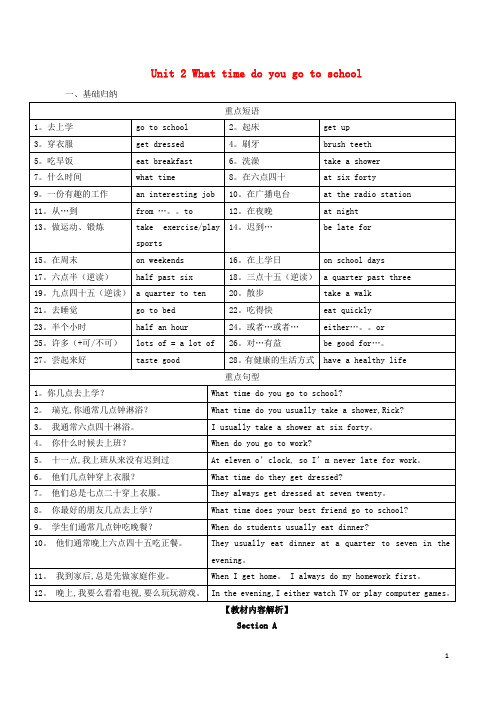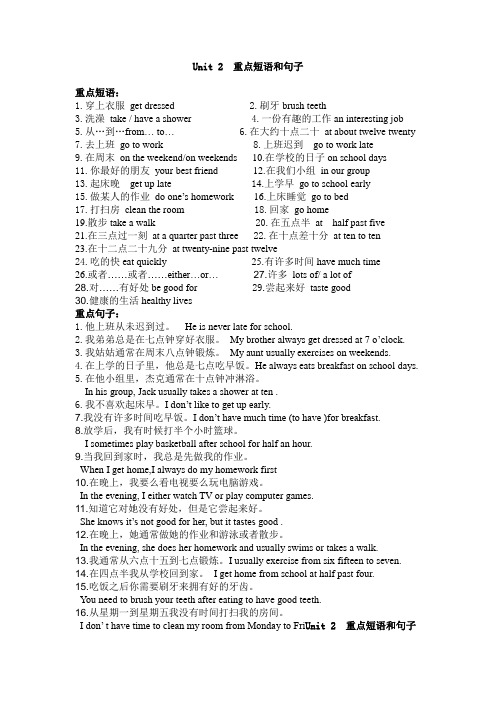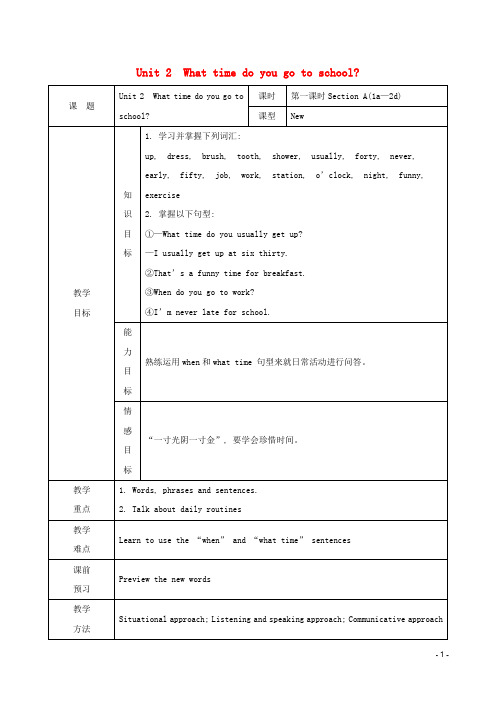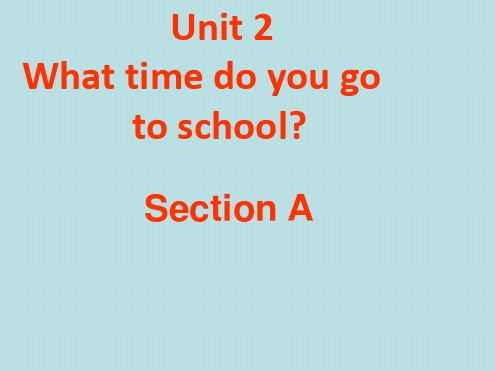新目标英语七年级下册Unit2WhattimedoyougotoschoolSectionB含答案
人教新目标七年级下册Unit2 What time do you go to school Sect

T eaching PlanUnit2What time do you go to school?SectionA1a-2dⅠ.Language goals:1.V ocabulary:dress,up,brush,tooth,shower,usually,early,station,funny,exercise2.Phrases:g e t up,dr essed up,g e t dressed,brush the teeth,take a shower,radiostation,eat breakfast3.Sentences and structures:-What time is it?-It’s…T eaching goals: T eaching important points:-What time do you usually…?-I usually….-What time d o es h e/sh e usually…?-He/She usually..(s/es)….II.Ability goals:1.T alk a bo u t routines;Ask a bo u t and say times.2.Improve the abilities of listening,speaking.3.Learn t o use the phrases and sentences of this part.III.Emotion goals:T o understand the importance of the time and making full use of time1.New words and expressions in this part.2.The routinesT eachingdifficult points:S tudents can talk a bo u t their routinesT eaching approaches: Learning T ask-based Language T eaching speaking,listeningapproaches:T eaching procedures:T eaching contents and the teacher’s activities S tudents’activitiessS tep One: Greeting1. Greet the students warmly ..2. Enjoy a son g abo u t the clock. S tep Two: Talk about time1. T: What time is it? S: It ’s eight o ’clock. (Ask several students a bo u t time.)2. Ask one student to be a clock and show us the time. S tep Three: Presentation1. -What do you usually do at 6:30? S: I usually …at …-What do I usually do at 6:30? Listen and guess. - Brush the t eethMotivate students t o g et into the class quickly.Use the new phrases to mak e sentences.2. Guess my morningListen and guess what I usually do in the morning.(get up, go t o work, g e t dressed, brush the teeth, take a shower).3. R ead the phrases loudly and r e me mber them. S tep Four: PairworkA: What time do you usually…?B: I us ually… at….Work in pairs and gr oups S tep Five: Groupworkt o practice the dialogueA: What time does he/she usually …?B: He/She usually –(s/es) up at…. S tep Six: Oral English1. I talk about my morning and then I ask students to talk about their own morning.I g e t up at 6:30. I brush my teeth at 6:35. I take a shower at 6:40. I eat breakfast at 7:00. I g e t dressed at 7:20. I go to work at 7:30. 2. Ask student to talk about Mrs W ang ’morning. Mrs Wang gets up at 6:30. She brushes the teeth at 6:35. She takes a shower at 6:40.She eats breakfast at 7:00. She getsdressed at 7:20. She g o es t o work at 7:30. S tep Seven: Listening practice1. Listen and mat ch the times with the actions. Draw lines from the clocks t o the pictures. (1b)2. Listen to the conversation. Complete the sentences.(2a)3. Listen again. Complete this shower schedule for Jim’s family.(2b)S tep Eight: ConversationS tudents can use the important sentence pattern to talk a b o u t their own morning and other ’s morningListen and fill in the blanks1R ead the conversation in2d loudly and quickly,then fill in the Discussion blanks.2.Role-playAsk two students t o imitate2d t o have an interview.Then show us it.Step Nine:Homework1.Make a survey with the drill“What time do e s your father/ mother g e t up/take a shower…?2.Design(设计)your ideal(理想的)day!Proverbs:•Time is life.R ead the conversation and give students the performanceR emember the importance of the time•Time is money.•All time is no time when it is past.•Every second counts.Unit2What time do you go to school?1.--What time do you usually ge t up?--I g e t up at6:30.2.–What time d o e s he/sh e usually g e t up/…?--He/She gets up at6:30.gets dr essedeats breakfastg o e s to workbrushes the t eeth。
新目标英语七年级下册Unit-2-What-time-do-you-go-to-school-教案

Unit 2 What time do you go to school?Section A 1 (1a-2d)一、教学目标:1. 语言知识目标:1) 能掌握以下单词:up, get up, dress, get dressed, brush, tooth (pl. teeth) brush teeth, shower, take a shower, usually, forty, fifty, wow, never, early, job, work, station, radio station, o'clock, funny, exercise能掌握以下句型:①—What time do you usually get up? —I usually get up at six thirty.②—When do you go to work? —I usually go to work at eleven o'clock.③—He has an interesting job. —He works at a radio station.2) 用when和what time引导的特殊疑问句询问时间和时间的表达法;用所学的目标语言对生活和学习活动做计划,学会合理地安排作息时间。
2. 情感态度价值观目标:本部分的话题是“日常作息时间”,学习内容贴近学生的生活,因为学生的作息时间安排是非常有规律的。
通过互相询问或谈论自己或对方的作息时间安排和活动计划,可以培养学生良好的作息习惯和守时习惯。
二、教学重难点1. 教学重点:1) 掌握时间的简单表达方式。
2) 学习询问和谈论时间和制订作息时间表。
2. 教学难点:when和what time引导的特殊疑问句和时间的表达法。
三、教学过程Ⅰ. Warming-up1. Greet the Ss as usual.2. Present some sentences about time.Ⅱ. Presentation1. 出示一个可以转动时/分针的大钟,一边调整时间,一边询问学生时间“Whattime is it?”。
人教版新目标英语七年级下册《Unit 2 What time do you go to school

人教版新目标英语七年级下册《Unit 2 What time do you go to school》优质教学设计2一. 教材分析人教版新目标英语七年级下册《Unit 2 What time do you go to school》主要介绍了日常生活中的时间安排,包括起床、吃早餐、上学、放学、做作业、娱乐等活动。
本节课主要让学生学会询问和回答别人日常活动的时间,并能够用英语描述自己的时间安排。
教材内容贴近学生生活,有利于激发学生学习兴趣,提高学生英语表达能力。
二. 学情分析七年级的学生已经掌握了基本的英语语法和词汇,具备一定的听说读写能力。
但部分学生对英语学习仍存在恐惧心理,缺乏自信心。
此外,学生在生活中对时间的认识和安排各有不同,需要教师引导学生逐步养成良好的时间管理习惯。
三. 教学目标1.知识目标:学生能够掌握日常活动词汇,如sleep, wake up, get up,go to school等;学会用What time do you go to school?询问别人日常活动的时间,并能用英语描述自己的时间安排。
2.能力目标:学生能够听懂、会说、会读、会写日常活动相关的句子,提高英语表达能力;学会用英语询问和回答别人日常活动的时间。
3.情感目标:培养学生珍惜时间、合理安排时间的意识,养成良好的时间管理习惯。
四. 教学重难点1.重点:学生能够运用所学词汇和句型询问和回答别人日常活动的时间。
2.难点:学生能够用英语描述自己的一日生活,并在实际情景中灵活运用所学知识。
五. 教学方法1.任务型教学法:通过设定各种实际情景,让学生在完成任务的过程中运用所学知识,提高语言实际运用能力。
2.情境教学法:创设生活情境,让学生在真实的环境中感受和体验英语,激发学习兴趣。
3.激励性评价:注重鼓励学生,提高学生自信心,激发学生学习积极性。
六. 教学准备1.教材:人教版新目标英语七年级下册《Unit 2 What time do you go to school》。
七年级英语下册Unit2Whattimedoyougotoschool短语语法知识点汇总新版人教新目标版

Unit 2 What time do you go to school 一、基础归纳【教材内容解析】Section A1.get dressed (P。
7)get dressed意为“穿上衣服”,dress用作动词,表示“给(某人)穿衣服”,接宾语时,只能接表示人的名词或者代词。
He can’t dress himself。
I usually dress my daughter before I go to work。
【拓展】辨析wear, put on和dress2.take a shower (P。
7)take a shower意为“洗淋浴”,相当于have a shower,shower用作名词,表示“淋浴”。
I often take a shower in the evening。
I take a cold shower when I feel tired。
3.What time do you usually get up, Rick? (P。
7)(1)what time用来询问具体的时间点,表示“什么时候”。
What time do you go to school?(2)usually是频度副词,意为“通常、一般”,在句中作状语,一般位于实义动词之前,连系动词be、助动词或者情态动词之后。
I usually have lunch at school。
He usually goes to school by bike。
4.I never get up so early。
(P。
8)early此处用作副词,表示“很早地”,反义词为late,意为“晚地”。
Please come to school early tomorrow。
【拓展】early还可以用作形容词,表示“早的、提前的”,反义词是late,意为“晚的”。
He gets up early to catch the early bus。
新目标英语七下unit 2whattimedoyougotoschool必背知识点重点短语和句子

Unit 2 重点短语和句子重点短语:1.穿上衣服get dressed2.刷牙brush teeth3.洗澡take / have a shower4.一份有趣的工作an interesting job5.从…到…from… to…6.在大约十点二十at about twelve twenty7.去上班go to work8.上班迟到go to work late9.在周末on the weekend/on weekends 10.在学校的日子on school days11.你最好的朋友your best friend 12.在我们小组in our group13.起床晚get up late 14.上学早go to school early15.做某人的作业do one’s homework 16.上床睡觉go to bed17.打扫房clean the room 18.回家go home19.散步take a walk 20.在五点半at half past five21.在三点过一刻at a quarter past three 22.在十点差十分at ten to ten23.在十二点二十九分at twenty-nine past twelve24.吃的快eat quickly 25.有许多时间have much time26.或者……或者……either…or…27.许多lots of/ a lot of28.对……有好处be good for 29.尝起来好taste good30.健康的生活healthy lives重点句子:1.他上班从未迟到过。
He is never late for school.2.我弟弟总是在七点钟穿好衣服。
My brother always get dressed at 7 o’clock.3.我姑姑通常在周末八点钟锻炼。
My aunt usually exercises on weekends.4.在上学的日子里,他总是七点吃早饭。
七年级英语下册Unit2Whattimedoyougotoschool教案新版人教新目标版

②When does Scott go to work?
③He always goes to work at seven o’clock.
能力目标
1.掌握What time及When特殊疑问句及其答语。
2.熟练使用频度副词
Summarize how to use what time to ask about their daily activities.
培养学生探究、归纳总结能力。
续表
教学环节
教师活动
学生活动
备课札记
Step 8
Consolidation
教师设置巩固检测练习:
Ⅰ.用所给词的适当形式填空
1. What time do you getdressed(dress) every morning?
2. Ss talk about themselves in pairs.
通过利用“信息差”进行口语结对活动,在交流信息过程中,进行真实的交际问答活动。
Step 6
Role-play (2d)
1. Let Ss read the conversation of 2d and answer the questions below.
2. Play the tape of2a.
3. Let Ss look at the chart of 2b carefully.
4. Play the tape of 2b.
1. Ss read the sentences in the box in2abefore listening to the tapபைடு நூலகம்.
七年级英语下册Unit2Whattimedoyougotoschool说课稿新版人教新目标版

Unit 2 What time do you go to school一、说教材(一)教材分析:1、教材简析:人教版《新目标英语》七年级下册第二单元中心话题是通过对日常生活作息时间的谈论,让学生学会时间的表达法.主要学习用what time和when来引导的特殊疑问句询问时间的标准用法,还有不同时间段的表达法以及表示频率副词的学习。
通过本单元的学习使学生学会不同时间段的表达法,学会用频率副词谈论自己日常生活习惯.通过对不同时间段的系统学习和理解,学会调整和安排自己的学习和课外活动时间,能够运用所学知识对某一活动进行合理的安排;使学生深刻理解时间的重要性,学会珍惜时间,并逐步养成良好的作息习惯.2、教学目标(知识目标、能力目标、德育目标)知识与能力:(1)掌握Section A 1a—2c和Section B 2a出现的单词和短语:time, what time, usually, get up, go to school, go home, shower, take a shower, do one’s homework, go to bed(2)掌握运用重点句型:What time do you usually get up; I usually get up at six o’clock/six thirty。
What time does she/he usually get up; She/He usually gets up at six o'clock/six thirty.过程与方法:通过运用英语正确表达时间和谈论日常作息安排,提高学生的综合语言运用能力。
情感、态度与价值观:通过学习,使学生充分认识时间的重要性,让学生养成良好的作息习惯和培养学生珍惜时间的优良品质。
确立教学目标的依据:以《英语课程标准》为理论依据,通过听、说、读、写四项基本语言技能的训练,激发学生的学习兴趣,帮助学生树立自信心和建立学习成就感,使他们在语言学习实践过程中发展综合运用能力.此外,根据教学内容,把培养学生的情感融化到日常教学当中。
人教版新目标英语七年级下册《Unit 2 What time do you go to school

人教版新目标英语七年级下册《Unit 2 What time do you go to school》教学设计3一. 教材分析人教版新目标英语七年级下册《Unit 2 What time do you go to school》主要围绕着日常生活中的时间安排展开。
本节课通过学习不同的时间表达方式,使学生能够灵活运用英语询问和描述日常作息时间。
教材内容丰富,包括对话、词汇、语法及任务型活动等,旨在培养学生的听说读写技能,提高他们的语言运用能力。
二. 学情分析七年级的学生已经掌握了基本的英语语法和词汇,具备一定的听说读写能力。
他们对新知识充满好奇心,善于模仿和交流。
但同时,部分学生可能对时间表达方式的掌握还不够熟练,需要教师的引导和练习。
三. 教学目标1.知识目标:学生能够掌握日常时间表达方式,如“What time do yougo to school?”、“I go to school at 7:00.”等;2.能力目标:学生能够在实际情境中运用英语询问和描述时间;3.情感目标:培养学生珍惜时间、合理安排作息的良好习惯。
四. 教学重难点1.重点:学生能够正确使用时间表达方式进行问答;2.难点:学生能够在实际情境中灵活运用时间表达方式。
五. 教学方法1.情境教学法:通过设定真实的生活情境,让学生在实际交流中学会运用时间表达方式;2.任务型教学法:设计各种任务活动,让学生在完成任务的过程中提高语言运用能力;3.互动式教学法:引导学生积极参与课堂互动,增强学生的自信心和合作精神。
六. 教学准备1.准备教材、课件和教学资源;2.设计相关任务活动和练习题;3.准备时间表、闹钟等教具。
七. 教学过程1.导入(5分钟)利用多媒体展示不同的时间场景,如早晨起床、上学、放学等,引导学生用英语描述这些场景。
2.呈现(10分钟)教师展示教材中的对话,让学生边听边跟读,掌握日常时间表达方式。
同时,教授时间词汇如“morning”、“afternoon”、“evening”等。
七年级英语下册unit2whattimedoyougotoschool单词短语及重点句型人教新目标版95

Unit 2 重点短语及句型背诵(留存备用考前复习)Key Phrases重点短语1.go to school去上学2.get up起床3.get dressed穿上衣服4.eat/have breakfast吃早餐5.take a shower洗淋浴6.at six thirty在六点半7.radio station/show广播电台/广播节目 8.from...to...从.....到......9.at night在夜间10.after that在那之后11.go to work去上班12.be late for work上班迟到13.brush teeth刷牙14.on weekends(在)周末15.half past six in the morning早上六点半 16.go home回家17.a quarter past three in the afternoon下午三点一刻18.do(one's)homework做作业 19.go to bed(early)(早早)去睡觉20.take a walk散步;走一走 21.eat quickly快速地吃22.play/do sports做运动 23.get home到家24.half an hour半小时 25.after dinner晚餐后26.eat a good breakfast吃一顿丰盛的早餐 27.either..or...或者...或者...28.play computer games玩电脑游戏 29.be good for..对.....有益/好处30.lots of/a lot of...大量,许多Key Sentences 重点句型1.What time do you usually take a shower, Rick?里克,你通常几点钟洗淋浴?2.I usually get up at six thirty.我通常在六点半起床。
人教版新目标七年级英语下册Unit2Whattimedoyougotoschool语法篇试题含答案

人教版新目标七年级英语下册Unit2Whattimedoyougotoschool语法篇试题学生通过本讲学习,能够掌握本单元的重点语法,并在综合能力上有一定的拓展。
一、what time与when1.what time翻译为“几点”问的是具体的时间,一般回答要具体到小时。
What time do you go to school?你什么时候/几点上学?I go to school at half past seven o’clock.我七点半去上学。
回答具体到点钟,且注意在几点前边的介词用at。
2.when也是对时间的提问,但与what time的区别是:用when提问,回答既可以是具体的时间,也可以是不具体的时间,如:in the morning,last year,in 1998等范围大的时间,例如:When does he take a shower?他什么时候洗澡?He takes a shower in the morning.他在早上洗澡。
也可用具体时间:I take a shower at 6 o’clock in the morning.我早上六点洗澡。
3. 问对方时间点只能用what time,如What time is it?二、频率副词的使用用法几个频率副词的用法★alwaysalways 意为“总是”,与进行时态连用时,可以表示赞扬,也可以表示讨厌等感情色彩。
e.g.(1)I shall always remember my first day at school. 我将永远记住我上学的第一天。
(2)He is always smoking. 他总是抽烟。
★usuallyusually可以指通常的动作,但是侧重已经形成的习惯,它是从已经形成的角度来说明动作。
e.g.(1)I usually do some shopping with my parents on Sundays. 我经常在星期天和我的父母一起去买东西。
新目标版英语七年级下册Unit2Whattimedoyougotoschool?(SectionA)含答案

新目标版英语七年级下册Unit 2 What time do you go to school?(Section A)一、根据句意及首字母提示完成句子1、根据句意及首字母提示完成句子(1)Tom is very young. He can't get d________ by himself(他自己).(2)Jim is seven years old. He can b________ his teeth in the morning.(3)—What's ten and thirty?—It's f________.(4)I always get up e________. I never get up late.(5)There are many(许多的)buses(公共汽车)at the bus s________.二、用所给词的适当形式填空2、用所给词的适当形式填空(1)—What time do you usually________ (eat) breakfast?—At seven thirty.(2)“That's a ________ (fun) time for breakfast.(3)________ (Lily) family has a cat. It's very interesting.(4)Jim usually ________ (do) his homework after school.(5)He ________ (brush) his teeth after he gets up every morning.三、从方框中选择合适的单词并用其正确形式完成句子3、从方框中选择合适的单词并用其正确形式完成句子(1)What do you ________ do on Sundays?(2)I ________ walk to school when it's sunny.(3)My father gets up early every day, so he is ________ late for work.(4)The sun(太阳) ________ rises(升起) in the east(东方) and sets in the west.(5)Tina finds a good ________. She ________ very hard (努力地) every day.(6)Mary wants to be a singer. She thinks it's an interesting ________.四、单选题4、Li Ming is the best student in our class. He __________ gets good grades(成绩).A、alwaysB、sometimes(有时)C、neverD、often5、Cathy was born blind(天生是盲的), so she has __________ seen our beautiful world.A、oftenB、sometimesC、seldom(很少)D、never6、My father, Mr. White, often __________ at six twenty in the morning.A、get upB、go upC、gets upD、go to bed7、Kate takes a shower at 8 o'clock in the evening.(替换画线部分)A、playsB、lovesC、hasD、brings8、—Do you like this movie?—Yes, it's the __________ one I've ever seen(曾经看过的).A、betterB、bestC、goodD、well9、—When do you go to school?—We go to school __________ Monday __________ Friday.A、on; toB、from, toC、in; andD、in, to10、Could I have an early morning call __________ six o'clock tomorrow(明天) ?A、onB、toC、atD、in11、The child doesn't need any help. He is old enough to __________ himself.A、put onB、wearC、dressD、take care12、__________ your father __________ watching TV in the evening?A、Does, likesB、Does, likeC、Is; LikesD、Do, likes13、Susan __________ her homework at school every weekend.A、don'tB、don't doC、doesn'tD、doesn't do五、按要求改写句子14、按要求改写句子(1)He wants to know about my weekend.(改为一般疑问句并作否定回答)________ he ________ to know about your weekend?No, he ________.(2)She goes to school at seven thirty.(改为否定句)She ________ ________to school at seven thirty.(3)She often has dinner at half past six in the evening(对画线部分提问)________ ________ does she often have dinner in the evening?(4)I take a shower at 8:00 in the morning.(对画线部分提问)________ ________ you ________ a shower in the morning?(5)I usually learn English at eight on the radio.(用he代替I改写句子)He ________ ________ English at eight on the radio.六、根据汉语完成句子15、根据汉语完成句子(1)—你几点钟锻炼?—我通常五点五十锻炼。
人教版新目标英语七年级下册《Unit 2 What time do you go to school

人教版新目标英语七年级下册《Unit 2 What time do you go to school》优秀教学设计2一. 教材分析人教版新目标英语七年级下册《Unit 2 What time do you go to school》主要讲述了日常生活中关于时间的基本表达方式。
通过本单元的学习,学生能够掌握一般现在时态的疑问句和回答,以及询问和描述日常活动的时间。
教材以真实的生活场景为背景,让学生在实际语境中学习、练习和应用英语,提高他们的语言运用能力。
二. 学情分析七年级的学生已经掌握了基本的英语语法知识和一定数量的词汇,具备一定的听、说、读、写能力。
但部分学生对英语学习的兴趣不足,学习积极性有待提高。
此外,学生之间在学习上的差距较大,有的学生英语基础较薄弱,需要更多的关注和辅导。
三. 教学目标1.知识目标:学生能够掌握一般现在时态的疑问句和回答,正确运用动词短语描述日常活动的时间。
2.能力目标:学生能够在实际语境中听、说、读、写关于时间的表达,提高语言运用能力。
3.情感目标:激发学生学习英语的兴趣,培养他们积极向上的学习态度,增强自信心。
四. 教学重难点1.重点:学生能够运用一般现在时态的疑问句和回答,描述日常活动的时间。
2.难点:学生能够在实际语境中正确运用动词短语,灵活表达关于时间的句子。
五. 教学方法1.情境教学法:通过设定真实的生活场景,让学生在实际语境中学习、练习和应用英语。
2.交际法:鼓励学生积极参与课堂交流,提高他们的听说能力。
3.任务型教学法:通过完成具体任务,让学生在实践中掌握语言知识,提高语言运用能力。
六. 教学准备1.教师准备:备好相关教学材料,如PPT、图片、实物等。
2.学生准备:预习本节课的内容,了解一般现在时态的疑问句和回答。
七. 教学过程1.导入(5分钟)教师通过提问学生日常生活中的一些活动,如“What do you like to do in your free time?”,引导学生用英语进行回答。
人教版新目标英语七年级下册《Unit2Whattimedoyougotoschool》说课稿

人教版新目标英语七年级下册《Unit 2 What time do you go to school》说课稿一. 教材分析人教版新目标英语七年级下册《Unit 2 What time do you go to school》是一篇以时间为主题的阅读文章。
通过描述不同人物在一天中的活动时间,引导学生学习如何询问和表达时间。
本节课的主要内容包括:掌握基本的时间表达方式,如“What time do you get up?”, “I get up at 7 o’clock.”等;学会使用一般现在时描述日常生活中的规律性行为;能够听懂、说出一日三餐的时间。
二. 学情分析七年级的学生已经掌握了基本的英语语法知识,对日常生活中的问候语和简单句型有一定的了解。
但部分学生对时间表达方式还不够熟悉,听力水平和口语表达能力有待提高。
因此,在教学过程中,教师需要关注学生的个体差异,针对不同水平的学生给予适当的指导。
三. 说教学目标1.知识目标:–掌握基本的时间表达方式,如“What time do you get up?”, “I get up at 7 o’clock.”等;–学会使用一般现在时描述日常生活中的规律性行为;–能够听懂、说出一日三餐的时间。
2.能力目标:–提高学生的听力水平和口语表达能力;–培养学生的团队合作精神。
3.情感目标:–激发学生学习英语的兴趣;–培养学生积极向上的生活态度。
四. 说教学重难点•基本的时间表达方式;•使用一般现在时描述日常生活中的规律性行为。
•听力理解;•口语表达。
五. 说教学方法与手段1.教学方法:–任务型教学法:通过完成各种任务,让学生在实践中学习、巩固知识;–交际法:引导学生进行角色扮演、小组讨论等互动活动,提高口语表达能力;–情境教学法:创设生活情境,让学生在真实的环境中学习、运用语言。
2.教学手段:–多媒体教学:利用课件、音频、视频等资源,丰富教学内容,提高学生的学习兴趣;–实物教学:使用钟表等教具,帮助学生直观地理解时间表达方式;–小组合作:学生进行小组讨论、互动,促进学生之间的交流。
新目标七年级下Unit2Whattimedoyougotoschool?sectionA

Rick's family shower's time
I usually_b_r_u_s_h_ _t_e_e_t_hat_s_e_v_e_n__fifteen
eat breakfast
What time do you usually eat breakfast?
I usually eat breakfastat seven o'clock.
go to school
What do you usually do at eight ?
I usually _t_a_k_e____a____s_h_o__w_e__r___at
eight o'clock .
What time do you usually brush your teeth ?
I usuallybru_s_h___m_y__te_e_t_hat eight o'clock.
_fif_t_ee_n
What do you usually do at six o'clock ?
get up I usually ________________ at six
o'clock .
What do you usually do at seven o'clock ?
run I usually _________at seven o'clock.
- 1、下载文档前请自行甄别文档内容的完整性,平台不提供额外的编辑、内容补充、找答案等附加服务。
- 2、"仅部分预览"的文档,不可在线预览部分如存在完整性等问题,可反馈申请退款(可完整预览的文档不适用该条件!)。
- 3、如文档侵犯您的权益,请联系客服反馈,我们会尽快为您处理(人工客服工作时间:9:00-18:30)。
新目标英语七年级下册Unit 2 What time do you go to school Section B同步练习一、翻译1、中译英/英译中(1)一半;半数________(2)晚于;过(时间)________(3)一刻钟________(4)家庭作业________(5)run________(6)clean________(7)walk________(8)很快地________(9)或者, 也________(10)有时________(11)taste________(12)life ________;________2、基本短语(1)do homework ________(2)take a walk ________(3)要么……要么……________(4)大量;许多________(5)a quarter to seven________(6)六点半________(7)half an hour________3、基本句式(1)—学生们通常何时吃晚饭?—他们通常在晚上6:45吃晚饭。
—________ do students ________ eat dinner?—They usually eat dinner at ________ ________ ________ ________ in the ________.(2)我没有很多时间吃早饭,因此我通常吃饭非常快。
I don't have ________ ________ ________ eat ________, so I usually eat very quickly.(3)她知道它对她有害,但它尝起来好!She knows ________ ________ ________ ________ her, but it ________ ________!(4)放学之后,我有时打半个小时的篮球。
After school, I sometimes play ________ for ________ ________ ________.(5)我有一个非常健康的生活。
I have ________ ________ ________ ________.二、语法填空4、用所给词的适当形式填空(1)—When does Mary usually go to bed?—She ________ (go) to bed at nine thirty.(2)Tony's sister always ________ (do) her homework first when she gets home.(3)Ice-cream usually ________ (taste)good.(4)My father often ________ (take) a walk in the evening.(5)Tony usually ge ts up late. He doesn’t have time ________ (eat) breakfast.三、选词填空5、从方框中选择合适的单词完成句子,注意词形变化(1)I usually ________ a very healthy life.(2)Mr. Wei always ________ his teeth before he goes to bed.(3)Zhang Hong often ________ her room in the afternoon.(4)Sometimes Paul ________ volleyball after school.(5)—When do you usually ________ for exercise after you get up in the morning? —At six fifteen.(6)He usually has breakfast ________.(7)She either ________ TV or plays computer games after she finishes her homework.(8)—What time does your aunt ________ up?—At about five thirty.(9)I usually ________ hamburgers for lunch.(10)My parents always ________ a walk after dinner.四、单项选择6、—When is Jay's concert?—It's __________ three o'clock __________ the afternoon of July 18th.A、at, inB、at, onC、on, inD、in,on7、He __________ a shower and then goes to bed.A、takeB、hasC、haveD、runs8、—When __________ Li Ping __________up?—At about seven o'clock.A、does, getsB、does, getC、do, getsD、do, get9、—When do you usually eat __________?—At a quarter to seven in the evening.A、breakfastB、lunchC、dinnerD、the dinner10、Johnson failed the test again, because he didn't study hard and __________ forgot to do his homework.A、alwaysB、hardly everC、never11、This apple __________ good. I like eating it.A、walksB、runsC、cleansD、tastes12、Seven thirty means(意思是)__________.A、half to sevenB、half past sevenC、a quarter to eightD、a quarter past eight13、3:15 pm means __________.A、a quarter past three in the afternoonB、a quarter past three in the morningC、a quarter to four in the eveningD、a quarter to three in the afternoon14、Music is good __________ our life, and my friend Lily is good __________ music.A、at;forB、for, atC、with; forD、at, with15、Tina goes __________ after __________ school at four thirty.A、home, theB、home; /C、to home, theD、to home;/五、完成句子16、根据汉语完成句子(1)王先生有时十点半睡觉。
Mr. Wang ________ ________ to bed ________ ________ ________ ten.(2)他通常做完作业后散散步。
He usually ________ ________ ________ after he ________ his ________.(3)周末,斯科特(Scott)要么去看电影要么打扫他的房间。
Scott ________ ________ to a movie ________ ________ his room on weekends.(4)里克( Rick)吃许多水果和蔬菜当午饭。
Rick ________ ________ ________ fruit and vegetables ________ lunch.(5)晚饭后我喜欢快步行走。
I like ________ ________ after dinner.六、句型转换17、按要求改写句子(1)Jim gets up at seven forty-five.(改为同义句)Jim gets up at ________ ________ ________ ________.(2)Kate has lots of friends.(改为同义句)Kate has ________ ________ ________ friends.(3)School starts at 8:00 every morning.(对画线部分提问)________ ________ ________ school ________ every morning?(4)We often go home after school.(对画线部分提问)________ do ________ often go home?(5)Tony usually swims on Sunday?(对画线部分提问)________ does Tony ________ ________on Sunday?七、阅读理解18、阅读下列短文,从每题所给的A、B、C和D项中,选出最佳选项。
I want to tell you some things about Tom's weekend. He is my good friend. At the weekend, Tom usually gets up late. He has breakfast. Then he reads an English book and listens to the radio for about one hour. After that he starts to do his homework. At about 11:30, he often cooks (烹饪) lunch for his family. In the afternoon, he usually plays volleyball with his friends. Sometimes he goes to the library in the afternoon. He loves his weekend very much.(1)The text(短文)is about __________.A、Tom's hobbies(爱好)B、Tom's weekendC、Tom's familyD、Tom's school(2)After Tom gets up, he does __________ things before cooking lunch.A、twoB、threeC、fourD、five(3)Tom must (一定) be a (an) __________.A、actorB、teacherC、studentD、worker(4)Tom __________ in the afternoon at the weekend.A、plays basketballB、goes to the moviesC、does his homeworkD、plays volleyball or goes to the library(5)Tom __________ at the weekend.A、has a good timeB、is not happyC、is very freeD、doesn't do his homework八、书面表达19、假如你是刘强,星期天不上学,你的活动安排是这样的:早晨6点半起床,之后开始洗淋浴,7点半与父母一起吃早饭,上午8:50和同学们一起去动物园(zoo), 中午12点在外边吃饭,你们中午吃鸡肉和蔬菜,下午2:15回家。
